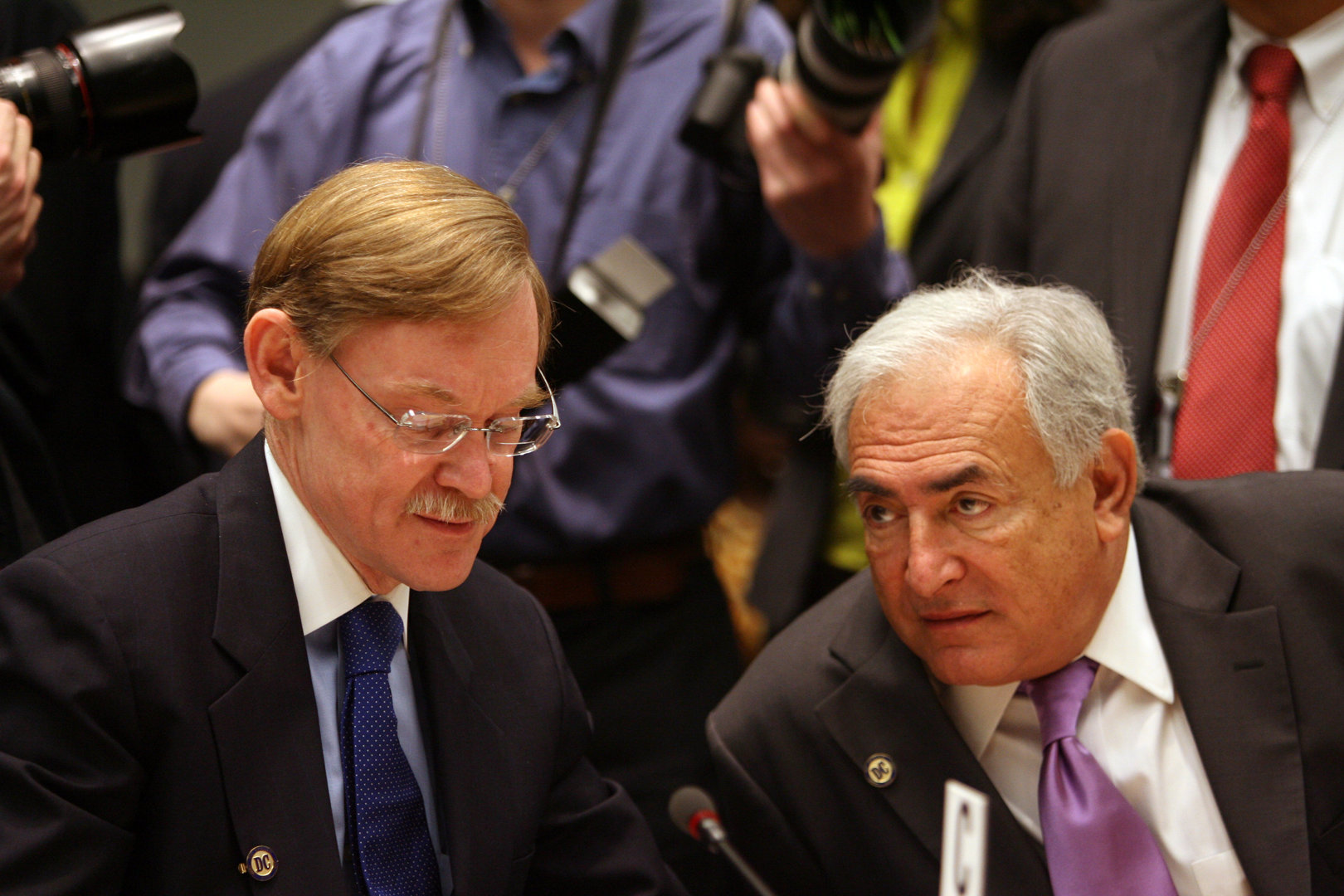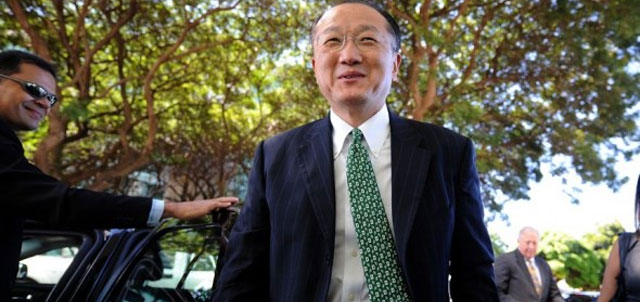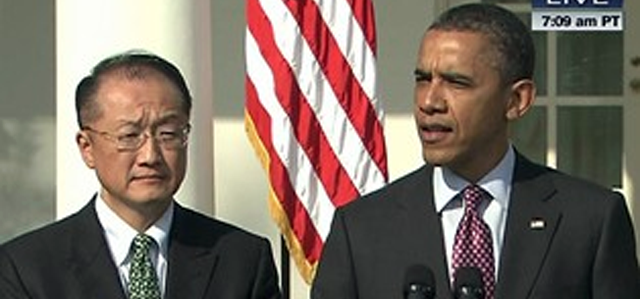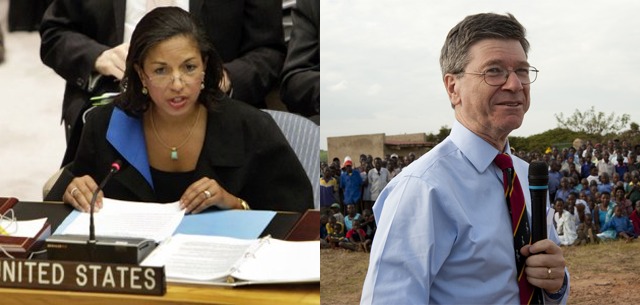Robert Zoellick announced earlier this month that he plans to step aside when his term as President of the World Bank ends on 30 June.
Almost immediately following his announcement, a number of developing governments and civil society groups issued the perennial call for the United States to abandon its monopoly on the post. Finance ministers from South Africa, Brazil and other emerging economies, meeting on the sidelines of the G20 summit last week, offered the pro forma call for the new President to be from an emerging state, noting the effort is “idealistic, but let’s give it a shot.”
A coalition of developments NGOs issued an open letter to the Bank’s Board of Governors, the major demand being that the new President be chosen in a “bicameral” process. The President is currently chosen by the Bank’s 25-member Board of Directors, where the U.S. holds enough voting shares and influence to deny the post to almost any candidate other than its preferred nominee. The coalition wants the selection to also require majority support by individual member states represented by the Bank’s 187-member Board of Governors.
“… the best way to ensure that developing countries play a central role throughout the selection process is for the successful candidate to be required to gain the support of a majority of both voting shares and member countries. This need not require any formal changes to the Bank’s articles of agreement, but could simply be agreed by the Board, to build on the limited proposals agreed in April 2011. To make this work, countries would need to vote independently, not through their constituencies, and declare their support publicly.”
(Regular updates by the coalition are being posted at www.worldbankpresident.org)
Soon after Zoellick’s announcement, U.S. Treasury Secretary, Timothy Geither, noted that the U.S. would put forward a qualified candidate which he hoped would be appointed in an “open and expeditious process.” The announced process will be both – nominations for his successor may be made by any member state up until 23 March, after which a short list of three candidates will be published and the candidates interviewed by the Board of Directors. A final selection will be made at the Bank’s spring summit on 20-22 April.
Early speculation suggested that Larry Summers, Hilary Clinton or Susan Rice as possible candidates. Despite the Obama administration stating it was open to a competitive process and other candidates, few political or civil society observers expect Zoellick’s successor to be anyone but an American, particularly during an American presidential election year.
On Capitol Hill, lawmakers said the World Bank job should stay in U.S. hands.
“I think it ought to be (an American) given the balance between that and the IMF and the interests that we have right now,” said Senate Foreign Relations Committee Chairman John Kerry, a Democrat from Massachusetts.
Senator Richard Lugar of Indiana, the committee’s top Republican, echoed that sentiment: “Ideally I would like to see an American replace him … That would be my preference.”
Nancy Birdsall, who heads the Center for Global Development in Washington, said that while the United States was committed to an open process on paper, domestic politics necessitated a American successor.
The coalition supports the reforms implemented by the Bank itself after last April (see Strengthening Governance and Accountability, “Selection of the President”) and which are consistent with the good processes used to select the senior leadership in other major multilaterals such as the Food and Agricultural Organization, the World Health Organization, and the International Maritime Organization.
But the coalition continues to call for more publicity of the candidates under consideration, already part of the announced process and, in calling for a “bicameral” selection, ignores the pragmatic political interests of the Bank’s member states. Even if the Bank adopted in whole the changes demanded in the coalition’s open letter, the members could still end up considering a sole American candidate. The only change that might further improve the competitiveness of the selection would be a lengthier nomination phase, but even that would require cross-regional agreement and solidarity on backing of a non-American nominee and the financing of his or her campaign.
In short, there is simply nothing in the coalition’s open letter that amounts to a coherent or realistic approach to reform.
(The most disappointing aspect of the coalition’s campaign is that the open letter is a practically verbatim copy of that sent to the IMF’s Board of Governors last year in the lead-up to Christine LeGard’s selection. The impression is one of laziness and lack of interest in understanding why that effort failed to turn any member’s view last year.)
The challenge to reform rests with the interest or capacity of member states in mounting a competitive campaign against the U.S. nominee. Most of the Directors are from developed states which have no concern with the U.S. monopoly on the post – particularly the Europeans and other U.S. allies. Developing states which might like to see the process be more competitive face the problem of having to finance a global campaign. Fewer still will do so given that the challenger will likely not be one of their nationals; any effective challenge to the U.S. candidate will require unity around a single nominee from the developing world.
Should reformers want to offer a realistic plan for making the process more competitive, they will need to take in account the politics of the stakeholders at the Bank and tack far away from the idealism or “fairness” language of typical appeals. Possible paths toward reform, this year or next, could include:
- Divide and unify: Advocates should jump on the comments by BRICS states and intensely lobby them to lead efforts to identify a qualified candidate around whom multiple member states can build solidarity. Statements of support for him or her should be offered early and often and a global campaign tour undertaken well before the deadline (if possible, before the U.S. announces its candidate). No doubt, the U.S. will attempt to broker a compromise on the candidate by offering incentives on other issues, as European states did in offering consideration of adding the yuan to the IMF basket of currencies last year.
- Leverage the Monopolies: Rather than call for abolishing the U.S. and European monopolies, advocates could agree to support their candidates at the Bank and the IMF in exchange for reserving the top post at the World Trade Organization – to be elected in 2013 – to a national from a developing country. Making this demand would seem counterproductive, of course, as the WTO has a remarkably transparent and open process for selecting its Director General, and proposing a new monopoly undermines the principle of openness and competitiveness. Leveraging the monopolies in this way, however, could help strengthen recipient states’ leverage on other interests in the major IFIs and provide some incentive for the U.S. and European states to consider other nationals at the top of the Bank and the IMF in the future.
- Promote the best American available: Reformers could play an important role in ensuring Zoellick’s successor will be qualified by promoting an American candidate with a strong background and competency in addressing development challenges and poverty, as well as the stated qualifications of a “track record of leadership” and “experience of managing large organizations with international exposure, and a familiarity with the public sector.” Opponents to Larry Summers’ rumored interest have mounted a petition against it, but no similar effort has arisen to positively identify a desirable, and qualified, candidate for the Obama Administration to put forward.
It is a safe bet that, come 1 July 2012, another American will assume the Presidency of the World Bank. Not because the United States should head the Bank, but because reform advocates have made few practical proposals to persuade other Bank members to vest any political (or actual) capital otherwise. Whether it will be Summers, Rice, Clinton (who has stated she has no interest in the post) or a yet to be named candidate, he or she will serve through 2017. At that point, U.S. presidential politics may (repeat, may!) permit the U.S. to step back slightly and weigh other nominations that may emerge. But this year, don’t count on it.




